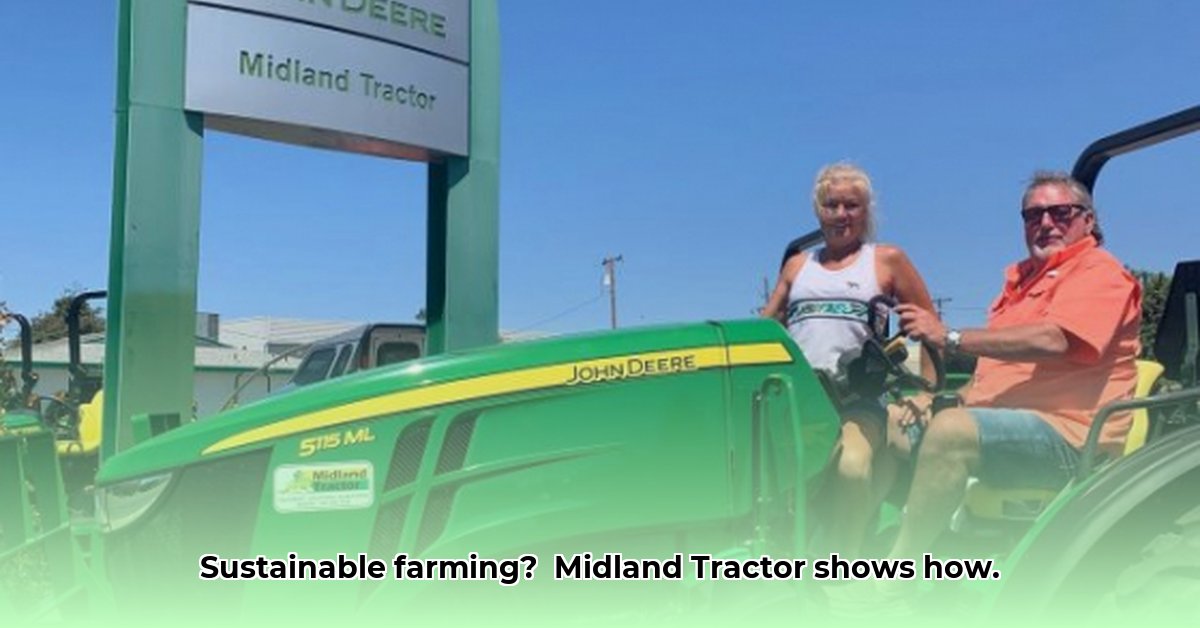
Midland Tractor, a Madera, CA-based agricultural equipment supplier, has served the Central Valley for over four decades. This case study examines Midland's contribution to sustainable agriculture, analyzing its current practices and proposing actionable steps for improvement. We explore their parts distribution system and grower education initiatives, highlighting both successes and areas needing enhancement. For additional insights on agricultural equipment, check out this resource.
Midland Tractor: A Deep Dive into Operations and Sustainability
Midland's four-decade history reflects its strong ties to the local farming community. Their business extends beyond equipment sales, encompassing support for the entire agricultural process. Their multi-brand parts drop-box system, for example, streamlines delivery, potentially reducing transportation emissions. However, the environmental impact of part production and packaging remains largely unquantified. A complete picture requires detailed data on manufacturing processes, material sourcing, and packaging disposal. Similarly, while their grower education programs aim to promote sustainable farming methods, the program's reach and measurable impact on farms' environmental footprints require further investigation. What specific techniques are taught? What are the demonstrable results? These unanswered questions highlight the need for more comprehensive data.
Sustainability Analysis: A Critical Examination
To assess Midland Tractor's sustainability effectively, we need a detailed analysis across various metrics. Presently, crucial data is missing, hindering a complete evaluation. The following table highlights the data gaps and potential sources for filling them.
| Metric | Current Status | Needed for Complete Picture | Potential Data Sources |
|---|---|---|---|
| Carbon Footprint | Largely Unknown | Detailed emissions data across all operations | Greenhouse gas accounting software, energy bills |
| Waste Reduction | Unknown | Waste generation and disposal data from all sources | Waste audits, recycling records, supplier data |
| Water Consumption | Unknown | Water usage across all operations | Water meters, irrigation records, supplier data |
| Energy Consumption | Unknown | Energy use across all operations | Utility bills, equipment specifications, supplier data |
| Supplier Sustainability | Unknown | Assessment of supplier practices and certifications | Supplier questionnaires, sustainability reports |
This lack of comprehensive data prevents a precise calculation of Midland's overall environmental impact. Transparency and data-driven reporting are crucial next steps. How can we measure success without benchmarks?
Stakeholder Perspectives: A Collaborative Approach
Sustainability in agriculture is not the sole responsibility of any single entity. Various stakeholders play a crucial role:
- Midland Tractor: Their role centers around equipment provision, parts distribution, and grower education. Their influence is significant, extending to numerous farms.
- Growers: Farmers' daily decisions directly impact environmental sustainability. Their adoption of sustainable practices hinges on knowledge, resources, and economic feasibility.
- Equipment Manufacturers: The environmental impact of equipment is heavily influenced by manufacturers' design and production choices. Sustainable manufacturing processes are vital.
- Regulatory Bodies: Government policies and regulations play a critical role in incentivizing sustainable agricultural practices.
Effective collaboration among these stakeholders is essential for achieving broader environmental goals. How might each group contribute to a more sustainable future?
Recommendations: Actionable Steps for a Greener Future
To significantly enhance its sustainability profile, Midland Tractor should implement the following actionable steps:
Comprehensive Sustainability Audit: A thorough audit, covering all aspects of operations (energy, waste, supply chain), will establish a baseline for improvement and identify key areas for action. This will form the foundation for future progress.
SMART Goals for Improvement: Establish Specific, Measurable, Achievable, Relevant, and Time-bound (SMART) objectives. These should include quantifiable targets for emissions reduction, water conservation, and waste management, with regular progress reporting. For instance, aiming for a 20% reduction in transportation emissions within two years provides a concrete benchmark.
Enhanced Grower Education Programs: Invest in detailed training materials and workshops focused on specific sustainable farming techniques, validated by credible research. Forming collaborations with agricultural extension services and research institutions would ensure best practices are implemented.
Transparency and Public Reporting: Regularly publish sustainability reports, including independently verified data, to demonstrate commitment and build trust with customers and stakeholders. This transparency is essential for accountability.
Sustainable Supply Chain Integration: Implement a stringent vetting process for suppliers, prioritizing those committed to environmentally responsible manufacturing and sourcing. Incentivize suppliers to adopt sustainable practices.
Collaboration and Advocacy: Actively collaborate with other stakeholders (equipment manufacturers, regulatory bodies, grower groups) to advocate for policies that promote broader sector-wide sustainability. This collaborative approach is key.
Conclusion: A Sustainable Vision for California Agriculture
Midland Tractor's path towards greater sustainability requires a proactive, data-driven approach. While initial steps are positive, comprehensive data collection, transparent reporting, and collaborative partnerships are crucial for making substantial and lasting positive impacts. Their journey exemplifies the broader challenges and opportunities facing the agricultural equipment sector in its pursuit of environmentally responsible practices. The success of this endeavor will benefit the entire Central Valley and contribute to a broader movement towards more sustainable agriculture.